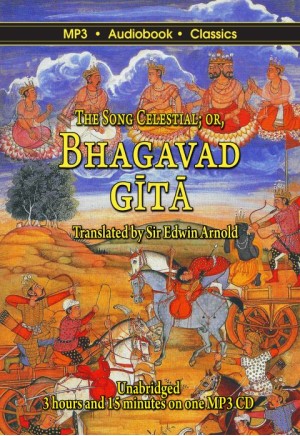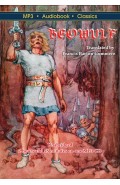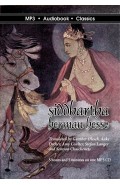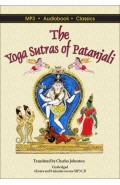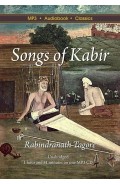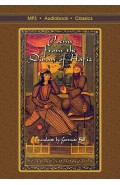| Track | Section | Length |
| 01 | 00 - Preface | 6:28 |
| 02 | 01 - Chapter 1 - The Book of the Distress of Arjuna | 9:27 |
| 03 | 02 - Chapter 2 - The Book of Doctrines | 18:12 |
| 04 | 03 - Chapter 3 - The Book of Virtue in Work | 9:30 |
| 05 | 04 - Chapter 4 - The Book of the Religion of Knowledge | 10:20 |
| 06 | 05 - Chapter 5 - The Book of Religion by Renouncing Fruit of Works | 7:41 |
| 07 | 06 - Chapter 6 - The Book of Religion by Self-Restraint | 10:32 |
| 08 | 07 - Chapter 7 - The Book of Religion by Discernment | 7:43 |
| 09 | 08 - Chapter 8 - The Book of Religion by Devotion to the One Supreme God | 7:12 |
| 10 | 09 - Chapter 9 - The Book of Religion by the Kingly Knowledge and the Kingly Mystery | 9:52 |
| 11 | 10 - Chapter 10 - The Book of Religion by the Heavenly Perfections | 10:25 |
| 12 | 11 - Chapter 11 - The Book of the Manifesting of the One and Manifold | 24:40 |
| 13 | 12 - Chapter 12 - The Book of the Religion of Faith | 5:42 |
| 14 | 13 - Chapter 13 - The Book of Religion by Separation of Matter and Spirit | 9:56 |
| 15 | 14 - Chapter 14 - The Book of Religion by Separation from Qualities | 6:58 |
| 16 | 15 - Chapter 15 - The Book of Religion by Attaining the Supreme | 6:29 |
| 17 | 16 - Chapter 16 - The Book of the Separateness of the Divine and Undivine | 7:02 |
| 18 | 17 - Chapter 17 - The Book of Religion by the Threefold Kinds of Faith | 7:05 |
| 19 | 18 - Chapter 18 - The Book of Religion by Deliverance and Renunciation | 20:14 |
Notes
Running time: 3 hours 15 minutes
Read by: Jothi Tharavant
Book Coordinator: Jothi Tharavant
Meta Coordinator: MaryAnnS
Proof Listener: pattymarie
Artwork
Cover: The gods look down on the mortal hero Arjuna (far right), who is directed and assisted by his personal charioteer (and God incarnate), Krishna (second from right), during the climactic engagement with the Kauravas at Kurukshetra. Krishna fortifies the will of the wavering Arjuna, convincing him at his moment of moral crisis that it is his duty to proceed and to fight for what is right. 16th-century. Author unknown.
Inset: Vyasa grants Sanjaya divine vision by Ramanarayanadatta astri, Gorakhpur Geeta Press.
Insert: Arjuna, dressed in courtly costume with a quiver slung over his shoulder and sword and buckler at his side, folds his hands in anjali mudra and kneels before his charioteer, Kṛṣṇa. The god sits holding the horses’ bridles, with his right hand raised in the teaching gesture, jnana mudra. Their conveyance is drawn by four horses, and its roof is surmounted by a chhattra. c. 1830.
Recordings
These recordings were made using the author’s original published work, which is in the public domain. The readings were recorded by members and volunteers of Librivox.org, which has generously made the recordings available to the public domain. The audio files have been lightly edited and have been engineered using professional audio tools for maximum sonic quality. While Librivox condones the sale and distribution of these recordings, it is not associated with the management or operations of MP3 Audiobook Classics.
The Bhagavad-Gita is the sixth book of the Mahabharata and a core book in Hindu scripture. Written sometime between the fifth and second centuries BC, it consists of 700 verses that recount a dialog between prince and warrior Arjuna and his charioteer and guide Lord Krishna. The dialog is framed by a conversation between blind ruler Dhritarashtra and his minister Sanjaya, a clairvoyant who can eavesdrop on the conversation between Krishna and Arjuna. The central conflict is warfare between two families that threatens to destroy a great kingdom. Arjuna is torn between his duty to serve the family on one side of the conflict and the sense that the conflict itself violates the eternal laws of Dharma, which he is also sworn to uphold. Frozen in his dilemma, he refuses to fight. Krishna realizes that he must impart the mysteries of dharmic action to Arjuna. In doing so, he reveals himself as a many-sided divine being, and instructs Arjuna in the structure of the universe, primordial nature, the concepts of prakriti, and the three gunas. The core message is the importance of self-control, faith, equanimity, unselfishness, and devotion. Only by attending to his duty will Arjuna transcend the bonds of matter and human behavior and achieve immortality. The battle is generally seen as an allegory for the struggles of human life and has prompted many interpretations over time. The Bhagavad-Gita was cited by Gandhi as a major inspiration in his work for Indian independence, referring to it as his “spiritual dictionary.”
Play sample:
Download a PDF datasheet
| Item Info | |
| EAN - DVD case | 0683422134708 |
| EAN - CD jacket | 0686175923339 |
| Media | MP3 CD |
| Package | DVD Box |
| Author | Vyasa (2nd - 5th century BC) |
| Translator | Sir Edwin Arnold |
| Recording | |
| Read by | Jothi Tharavant |
| Length | 3 hours 15 minutes |
| Type of Reading | Solo |
Bhagavad-Gita
- Author: Vyasa
- Product Code: DB-1155
- Availability: In Stock
-
$9.99
Available Options
Related Products
Beowulf
Beowulf is the title of the oldest surviving epic poem of Old English and the first to be written in..
$9.99
Siddhartha
Siddhartha, published in 1922, tells the story of a young man who undertakes a journey of self-disco..
$9.99
The Yoga Sutras of Patanjali
The Yoga Sūtras of Patañjali is a collection of 196 Indian sūtras, or aphorisms, composed in approxi..
$9.99
Songs of Kabir
The Songs of Kabir is a collection of 100 poems attributed to the 15th-century Indian poet and mysti..
$9.99
Poems from the Divan of Hafiz
The forty-three poems contained in this collection include some of the best-known work of Hafiz and ..
$8.99

